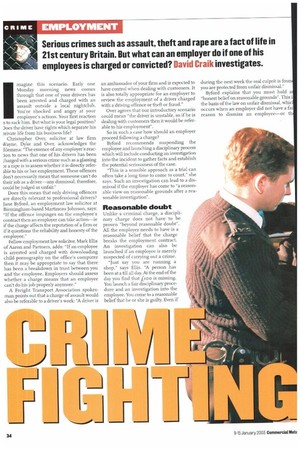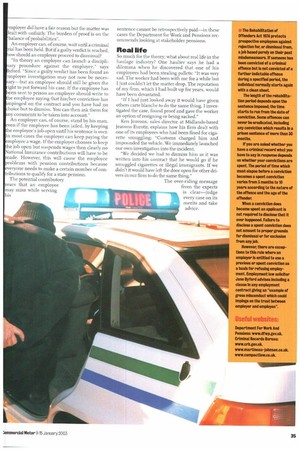Serious crimes such as assault, theft and rape are a
Page 34

Page 35

If you've noticed an error in this article please click here to report it so we can fix it.
fact of life in 21st century Britain. But what can an employer do if one of his employees is charged or convicted? David Craik investigates.
magme this scenario. Early one Monday morning news comes through that one of your drivers has been arrested and charged with an assault outside a local nightclub. You're shocked and angry at your employee's actions. Your first reaction s to sack him. But what is your legal position? Does the driver have rights which separate his arivate life from his business life?
Christopher Over, solicitor at law firm Wayne, Dyke and Over, acknowledges the lilemma: "The essence of any employer's reacion to news that one of his drivers has been zharged with a serious crime such as a glassing Dr a rape is to assess whether it is directly referable to his or her employment. These offences don't necessarily mean that someone can't do their job as a driver—any dismissal, therefore, could be judged as unfair."
Does this mean that only driving offences are directly relevant to professional drivers? Jane Byford, an employment law solicitor at Birmingham-based Martineau Johnson, says: "If the offence impinges on the employee's contract then an employer can take action—ie if the charge affects the reputation of a firm or if it questions the reliability and honesty of the employee."
Fellow employment law solicitor, Mark Ellis of Aaron and Partners, adds: "If an employee is arrested and charged with downloading child pornography on the office's computer then it may be appropriate to say that there has been a breakdown in trust between you and the employee. Employers should assess whether a charge means that an employee can't do his job properly anymore."
A Freight Transport Association spokesman points out that a charge of assault would also be referable to a driver's work: "A driver is bassador of your firm and is expected to have control when dealing with customers. It is also totally appropriate for an employer to review the employment of a driver charged with a driving offence or theft or fraud."
Over agrees that our introductory scenario could mean "the driver is unstable, so if he is dealing with customers then it would be referable to his employment".
So in such a case how should an employer proceed following a charge?
Byford recommends suspending the employee and launching a disciplinary process which will include conducting an investigation into the incident to gather facts and establish the potential seriousness of the case.
"This is a sensible approach as a trial can often take a long time to come to court," she says. Such an investigation can lead to a dismissal if the employer has come to "a reasonable view on reasonable grounds after a reasonable investigation".
Reasonable doubt
Unlike a criminal charge, a discipli nary charge does not have to be proven "beyond reasonable doubt".
All the employer needs to have is a reasonable belief that the charge breaks the employment contract. An investigation can also be launched if an employee is merely suspected of carrying out a crime.
"Just say you are running a shop," says Ellis. "A person has been at a till all day. At the end of the day you find that £m() is missing. You launch a fair disciplinary procedure and an investigation into the employee. You come to a reasonable belief that he or she is guilty. Even if during the next week the real culprit is foun you are protected from unfair dismissal."
Byford explains that you must hold a "honest belief on reasonable grounds". This the basis of the law on unfair dismissal, whic occurs when an employer did not have a fa reason to dismiss an employee—or th mployer did have a fair reason but the matter was ealt with unfairly. The burden of proof is on the 'balance of probabilities".
An employer can, of course, wait until a criminal l has been held. But if a guilty verdict is reached, ow should an employer proceed to dismissal?
"In theory an employer can launch a discipliary procedure against the employee," says yford. "Since a guilty verdict has been found an mployer investigation may not now be necesary—but an employee should still be given the 'glut to put forward his case. If the employee has een sent to prison an employer should write to e employee saying that his/her conviction has mpinged on the contract and you have had no hoice but to dismiss. You can then ask them for fly comments to be taken into account."
An employer can, of course, stand by his man, yen if the employee has been jailed, by keeping e employee's job open until his sentence is over. n most cases the employer can keep paying the mployee a wage. lithe employer chooses to keep e job open but suspends wages then clearly no National Insurance contributions will have to be ade. However, this will cause the employee roblems with pension contributions because veryone needs to make a certain number of conributions to qualify for a state pension.
The potential contributory ears that an employee may miss while serving h i s sentence cannot be retrospectively paid—in these cases the Department for Work and Pensions recommends looking at stakeholder pensions.
Real life
So much for the theory; what about real life in the haulage industry? One haulier says he had a dilemma when he discovered that one of his employees had been stealing pallets: "It was very sad. The worker had been with me for a while but I just couldn't let the matter drop. The reputation of my firm, which I had built up for years, would have been devastated.
"If I had just looked away it would have given others carte blanche to do the same thing. I investigated the case, found proof and gave the worker an option of resigning or being sacked."
Ken Jeavons, sales director at Midlands-based Jeavons Eurotir, explains how his firm dealt with one of its employees who had been fined for cigarette smuggling: "Customs charged him and impounded the vehicle. We immediately launched our own investigation into the incident "We decided we had to dismiss him as it was written into his contract that he would go if he smuggled cigarettes or illegal immigrants. If we didn't it would have left the door open for other drivers in our firm to do the same thing."
The over-riding message from the experts is clear—judge every case on its merits and take advice.
























































































































































